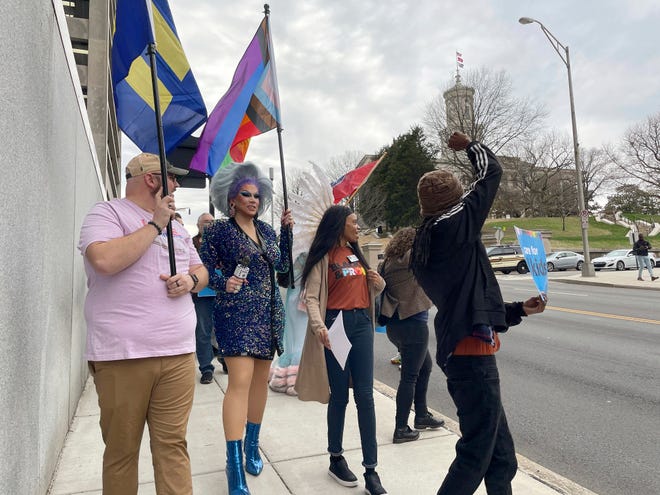Tennessee became the latest state to totally ban gender-affirming health care for transgender youth after Gov. Bill Lee signed a bill prohibiting surgeries and hormone treatments on Thursday.
Lee also signed the first law of its kind in the country effectively banning drag performances on public property, with language prohibiting “adult-oriented” entertainment, including “male and female impersonators.” The legislation was filed after a flurry of controversies over drag shows across the state.
The new health law bans medications such as puberty blockers and hormone treatments to treat any underlying gender dysphoria cause, affecting Tennessee children who identify as transgender and nonbinary. Surgeries, which were rare in Tennessee, are also banned.
Tennessee joins a wave of conservative states to pass or consider laws restricting gender-affirming health care. Mississippi’s bill banning surgeries, hormone therapies, and puberty blockers for minors was signed into law on Tuesday.
As of last June, over a dozen states were implementing or considering such laws, according to the Kaiser Family Foundation. Similar bans are making their way through legislatures or have recently passed in Utah, South Dakota and Iowa.
GENDER-AFFIRMING CARE EXPLAINED:What to know about health care for transgender and nonbinary communities
A slew of medical organizations including the World Health Organization, the American Medical Association, the American Academy of Pediatrics, and the American Psychiatric Association all endorse gender-affirming care as an effective treatment for gender dysphoria among minors.
Current children in Tennessee who take these medications will have until March 31, 2024, to cycle off of the drugs. The law, which was fast-tracked by the legislature’s Republican supermajority in this year’s legislative session, will officially go into effect this summer.
The American Civil Liberties Union, the ACLU of Tennessee and Lambda Legal said they plan to sue over the law, accusing Lee of discrimination against transgender people and ignorance about “life-saving” care.
“We will not allow this dangerous law to stand,” the organizations said in a statement. “We are dedicated to overturning this unconstitutional law and are confident the state will find itself completely incapable of defending it in court. We want transgender youth to know they are not alone and this fight is not over.”
SHOULD TRANS YOUTHS HAVE ACCESS TO GENDER-AFFIRMING CARE?:Why bans are ‘cruel’ and ‘dangerous’
The law was narrowly tailored to not ban any one medication, but rather medical treatment of an underlying diagnosis: gender dysphoria, in addition to “gender identity disorder, gender incongruence, or any mental condition, disorder, disability, or abnormality.”
Lawmakers filed the legislation after a high-profile controversy in the fall over Vanderbilt University Medical Center offering gender-transition care. Conservative commentators seized on the issue and misinformation spread that doctors were performing genital surgeries on minors. Vanderbilt denied the claims, while stating it performed a very small number of gender-affirming procedures — chest surgeries — per year on patients 16 and older with full parental consent.
House Majority Leader William Lamberth, R-Portland, the House sponsor, said minors lack the maturity to make “life-altering” medical decisions before they become adults.

Democrats argued the GOP’s position is inconsistent and targeted at trans and nonbinary youth, an already vulnerable population. The law still allows minors to seek cosmetic or gender-affirming surgeries such as breast reductions, as long as gender dysphoria or gender identity issues aren’t involved.
“It has nothing to do with protecting children from unnecessary medical procedures,” Rep. Bo Mitchell, D-Nashville, said in a floor debate on the bill. “(Some children) can get their breast enhancements, their nose jobs, that’s OK, but these children can’t have any medical procedures?”
The law banning drag performances in public places relegates them to age-restricted venues. The law, which goes into effect July 1, doesn’t use the word “drag,” but classifies drag performances as adult cabaret, among topless dancers, go-go dancers, exotic dancers and strippers.
At least seven other states are considering laws targeting drag performances, according to an analysis by the nonprofit PEN America.
A DRAG SHOW, A PROTEST AND A LINE OF GUN:How the battle over one issue is tearing at America
Conservatives have sounded an alarm about events such as “drag story hours” at libraries where drag performers read to children and all-age performances, while supporters say the art of drag is an important part of LGBTQ culture, and lament that the ban would alter the way Pride parades are carried out, for example.
“Drag is not a threat to anyone. It makes no sense to be criminalizing or vilifying drag in 2023,” said Lawrence La Fountain-Stokes, a professor of culture and gender studies at the University of Michigan and author of “Translocas: The Politics of Puerto Rican Drag and Trans Performance.”
Contributing: The Associated Press

















Discussion about this post